Reviews
Billy Wilder
USA, 1950
Credits
Review by Michael Nordine
Posted on 10 March 2011
Source Paramount DVD
Categories Brackett & Wilder
Charles Brackett and Billy Wilder collaborated on over a dozen films before Sunset Boulevard, some better-received than others. For instance: The Lost Weekend won the top prize at both Cannes and the Academy Awards, to date only one of two films to do so; conversely, The Emperor Waltz received mixed reviews and is today considered one of the pair’s lesser efforts. With these highs and lows in mind, it is perhaps unsurprising that their last artistic endeavor turned its gaze inward and focused on the dark side of Hollywood itself. The effect was immediate: Sunset Boulevard won three of the eleven Oscars for which it was nominated (including one for Brackett, Wilder and D.M. Marshman Jr.’s screenplay) despite more than a little backlash from scandalized residents of the town whose underbelly the film brought to light. For reasons that remain unspoken if not unknown, the two men never worked together again. Brackett went one way, Wilder another, but their legacy endures in the form of this, their final and best-remembered effort. Wordsmiths both, Brackett and Wilder framed what many consider their magnum opus through the lens of—what else?—a struggling screenwriter named Joe Gillis, who happens upon a seemingly-empty mansion while ducking a pair of creditors. There he meets the real star of Sunset Boulevard, one Norma Desmond, around whom any discussion of the film is likely to center.
A faded star of yore who ruled the silent era but never transitioned into the talkies, Norma is at once an unrivaled narcissist and a hopelessly lost soul. Unable, or unwilling, to accept that her best years are behind her, she’s still “waving proudly to a parade that has long passed her by,” as Joe puts it: screening her old films, writing a new one, and in general carrying on as though she remains the it girl she once was. Her manservant, Max, aids her in this delusion by sending her fan mail and relaying any and all news from the outside world through the rose-tinted filter she’s used to. Norma doesn’t want to adapt to the way things are; she wants them to return to her. When Joe tells her that she can be “big” again, she responds with these immortal words:
“I am big. It’s the pictures that got small.”
Host to these lies agreed upon is what Joe calls a “great, big white elephant of a house” as drab as it is glamorous. Among its many odd facets: a drained pool with rats scuttling about, a “ghost of a tennis court,” and a garden that serves as the final resting place of Norma’s recently-deceased pet monkey. There are no locks on any of the doors so that Max may more easily reach her when she next attempts suicide. Clear-cut evidence of Norma’s fragile state of mind to anyone on the outside looking in, the house is Norma’s sanctuary from the outside world—and her last line of defense against the fact that her greatness is now spoken of only in the past tense. This tension between the inner and outer—perceived reality versus actual reality—embodied by the mansion creates a pervading sense of disenchantment that permeates the rest of the film.
As alluded to above, the choice to use a writer as the means by which we’re made privy to the film’s goings on—to say nothing of its underlying meaning—was no doubt a targeted one. Joe is both a part of and separate from the machinations of Hollywood and the motion picture industry as a whole, not least because he isn’t especially successful. That the work he manages to get is all behind the camera (and thankless at that) makes it easy for him to see through the veneer of Hollywood and, more importantly, Norma herself. The harder she tries to convey that she is what she imagines herself to be, the more obvious it becomes to Joe that the world she lives in is of her own imagining. And yet, in what amounts to one of the film’s subtlest developments, Joe gradually becomes complicit in her delusions. Taken on to refine her tome of a script and thus, one would imagine, provide some semblance of organization to what is no doubt a chaotic and Norma-centric story, he instead lets her madness seep into his own life. The reason why is simple: greed. While under Norma’s live-in employ, Joe enjoys all the luxuries that come with her wealth and sees no reason to end it. In so doing, he also becomes part of the small but vocal echo chamber reminding Norma of her greatness. Or, in his words:
“I didn’t argue with her. You don’t yell at a sleepwalker; he may fall and break his neck. That’s it—she was still sleepwalking among the giddy heights of a lost career, plain crazy when it came to that one subject: her celluloid self. The great Norma Desmond. How could she breathe in that house so crowded with Norma Desmonds, more Norma Desmonds, and still more Norma Desmonds?”
Sequestered within this palatial home though it is, Sunset Boulevard manages to evoke Hollywood in a manner unlike any other film. (That which comes closest, David Lynch’s Mulholland Drive, is clearly a disciple of this film.) Norma’s house is a sort of living museum that exhibits the highs and lows of Hollywood, which exists in the film less as a place and more as a state of mind. Another reason for the film’s authenticity is its use of actors and situations that closely mirror their real-world counterparts. Gloria Swanson, who plays Norma, was herself a star during the silent era who hadn’t worked much prior to Sunset Boulevard; Buster Keaton, Cecil B. DeMille (who, as in the film, directed Swanson many times), and Anna Q. Nilsson all make cameos; and the true relationship between Norma and Max—that he, too, used to direct her—was also true of Swanson and Eric von Stroheim, who plays Max. It’s as troubling as it is unsurprising that the aspects of Sunset Boulevard most effective in skewering Hollywood are those that draw more from reality than they do from the collective imagination of Brackett and Wilder. Anyone looking for Tinseltown to air its dirty laundry in public can nowadays simply turn on an E! True Hollywood Story, but Sunset Boulevard’s blistering portrayal of the specters haunting the city was heretofore unprecedented. What’s more, it could easily be argued that its vision remains unsurpassed in this regard.
A too-literal but nonetheless poignant scene occurs when Norma decides to confront Cecil B. DeMille on the set of his newest picture in order to ask what he thinks of her screenplay. DeMille, who has no interest in her script, politely exchanges niceties with Norma before having her sit in his director chair while he gets back to work. It’s not long until people notice her, including a spotlight operator who, much to Norma’s delight, shines the light directly on her face. DeMille notices, breaks up the crowd, and says to “turn that light back where it belongs”—onto the future in which Norma plays no part. Bittersweet and telling, the moment serves as a fitful reminder of Norma’s true self: revered for who she once was but no longer relevant. Her vanity-driven inability to move on from yesteryear keeps her in a state of suspended animation, and our pity for her grows at roughly the same rate as our dislike.
What is perhaps most disconcerting about all this is the fact that Norma’s lot is hardly worth lamenting. She’s treated like a goddess by everyone who comes across her; that she hasn’t worked in years seems to have done little to reduce her stature as Hollywood royalty. Indeed, there’s no indication that her absence from the screen was due to a series of unsuccessful appearances that weakened her star power rather than a sort of self-imposed exile at the height of her fame. But this isn’t enough for Norma; her vanity and insecurity are inextricably linked, and neither will allow for reality to dawn on her in any meaningful way. Norma is something of a living legend, but she’s also an unaware ghost: no longer of the world in which she thinks she lives.
In the end, when it all comes crashing down as we know it must, police arrive on the scene in a callback to the film’s opening sequence: a long tracking shot over the asphalt of Sunset Boulevard itself that gives way to palm trees and sirens. Norma’s house now crawling with members of the press and the LAPD alike, she convinces herself—or at least pretends—that they’re crew members on her new film. Norma, peacock that she is, finally gets to show her feathers for the audience she’s been expecting for years.
More Brackett & Wilder
-
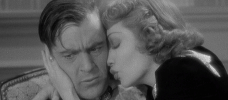
Bluebeard’s Eighth Wife
1938 -
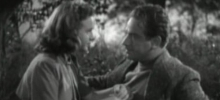
That Certain Age
1938 -

Midnight
1939 -
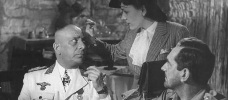
Five Graves to Cairo
1943 -
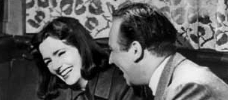
Ninotchka
1939 -
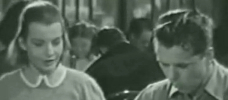
What a Life
1939 -
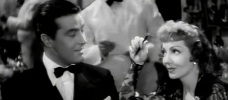
Arise My Love
1940 -
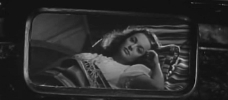
Hold Back the Dawn
1941 -
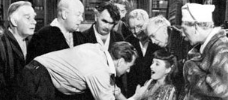
Ball of Fire
1941 -
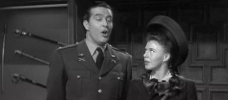
The Major and the Minor
1942 -
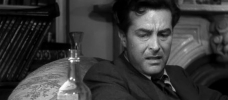
The Lost Weekend
1945 -
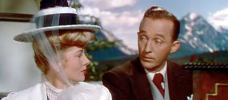
The Emperor Waltz
1948 -
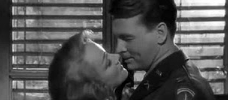
A Foreign Affair
1948 -
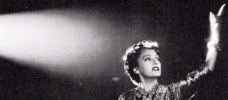
Sunset Boulevard
1950
We don’t do comments anymore, but you may contact us here or find us on Twitter or Facebook.



